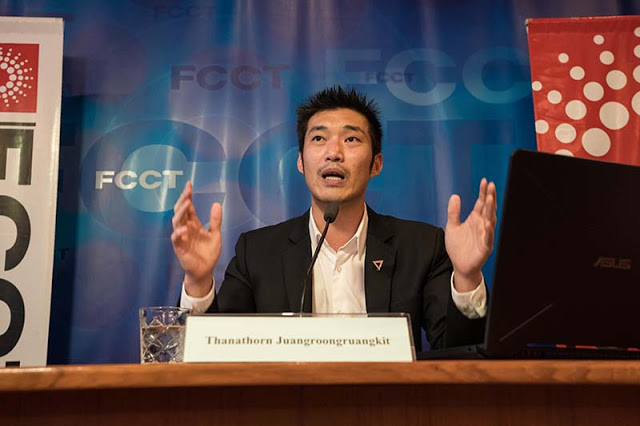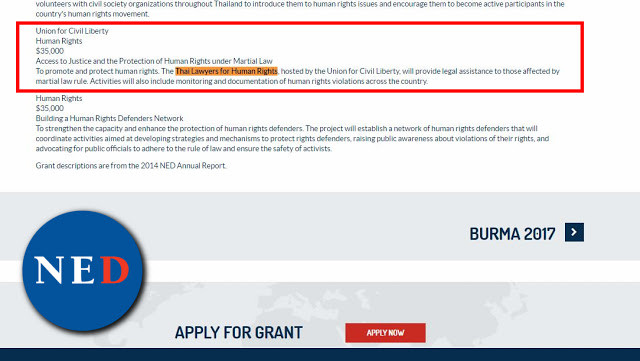
US Meddling in Thai Politics Continues
August 12, 2020US-backed party vowed street protests earlier this year, now Western media pretends protests are "spontaneous," "leaderless." Evidence reveals leaders are US-funded, goal is ultimately anti-Chinese, not "pro-democracy."
August 12, 2020 (Joseph Thomas - NEO) - Democracy by definition is a process of self-determination. For Thailand, democracy means the process of the Thai people determining the nation's path into the future.
Nothing could have less to do with the Thai people and this process of democratic self-determination than a capital and its interests located on the other side of the planet. Yet that hasn't stopped the United States from insisting otherwise.
Following the dissolution of Thai opposition party Future Forward for blatant violations of Thai election laws, the US embassy in Bangkok has been regularly mentioned in international and local media reports weighing in on the matter which most certainly constitutes Thailand's internal affairs and should remain off-limits to foreign interests.
One example of this comes from English-language newspaper Bangkok Post in their article, "Pannika dodges rally questions," in which Future Forward's spokesperson explained that the disbanded party would resort to street mobs in order to continue pursing the party's single-minded agenda of ousting the ruling government.
The article concludes by noting:
Redefining "Democracy" as Needed
In other words, Future Forward came in distant third and belongs to a political coalition with Pheu Thai holding a minority in parliament. In ordinary democracy, the minority does not decide or direct policies at the expense of the majority. In Washington's version of democracy, facts like Future Forward's unpopularity are spun or shrugged off in order to present it and its agenda as relevant regardless.
This is because Future Forward and its billionaire founder and leader Thanathorn Juangroongruangkit represent Washington's latest efforts to place a client regime into power in Thailand as part of a wider regional effort to surround China with uncooperative and even hostile neighbours to hinder its regional and international rise.
Defending a US Client
Thanathorn has toured the US and vowed to serve US interests. He has vowed to roll back Thai-Chinese relations and has even threatened to replace Chinese-built high-speed rail projects already under construction with non-existent US alternatives like the yet-to-be-developed "hyperloop."
Bloomberg's "Thailand needs hyperloop, not China-built high-speed rail: Thanathorn," would note:
Bangkok Post's "Future Forward Party vows to cut army budget," reported:
As Future Forward's remnants now organise street protests it should be remembered how the US has backed similar street mobs in recent years including the so-called "Arab Spring" in 2011 and the more recent mobs in Hong Kong and how Hong Kong's opposition is linked to Future Forward.
An October 2019 Reuters article titled, “China denounces Thai politicians for show of support to Hong Kong activists,” would report:
The prospect of this verbal support transforming into material support for disruptive street protests is a direct threat to Thailand's political and economic stability and that of the wider region and a threat already manifesting itself.
Street protests in Thailand are not only being openly led and supported by Thanathorn and others in his political party, core leaders including lawyer Anon Nampa are drawn from US government funded fronts posing as nongovernmental organisations.
Anon Nampa's Thai Lawyers for Human Rights (TLHR) is funded by the US via the National Endowment for Democracy (NED).
The Bangkok Post in a 2016 article, “The lawyer preparing to defend herself,” would also note:
The US NED also funds media platforms like Prachatai and legal organisations like iLaw which is currently petitioning to have Thailand's entire constitution rewritten, The Nation would report.It is worth repeating, iLaw, a US government-funded front, is petitioning to have Thailand's constitution rewritten.
While Thailand's Ministry of Foreign Affairs will likely defer to patience the public should take note not only of US meddling, but who that meddling is being done on behalf of as Future Forward attempts to cling to its existence and reinvent itself to carry on as a vector of foreign interests at the expense of Thailand and its own best interests.
Joseph Thomas is chief editor of Thailand-based geopolitical journal, The New Atlas and contributor to the online magazine “New Eastern Outlook”.
August 12, 2020 (Joseph Thomas - NEO) - Democracy by definition is a process of self-determination. For Thailand, democracy means the process of the Thai people determining the nation's path into the future.
Nothing could have less to do with the Thai people and this process of democratic self-determination than a capital and its interests located on the other side of the planet. Yet that hasn't stopped the United States from insisting otherwise.
Following the dissolution of Thai opposition party Future Forward for blatant violations of Thai election laws, the US embassy in Bangkok has been regularly mentioned in international and local media reports weighing in on the matter which most certainly constitutes Thailand's internal affairs and should remain off-limits to foreign interests.
One example of this comes from English-language newspaper Bangkok Post in their article, "Pannika dodges rally questions," in which Future Forward's spokesperson explained that the disbanded party would resort to street mobs in order to continue pursing the party's single-minded agenda of ousting the ruling government.
The article concludes by noting:
On Saturday, the US Embassy in Bangkok said the court decision risked disenfranchising the party's voters and raised questions about their representation within Thailand's electoral system.
It said the US strongly supports democratic governance around the world, and appreciates Thailand's recent seating of a democratically elected government. The US does not favour any party, but noted that more than six million voters chose the FFP.Indeed, more than six million voters chose Future Forward. However, omitted is the fact that several million more chose its larger and more established partners, Pheu Thai. Several million more still chose Palang Pracharath which currently leads the ruling government coalition which came into power following the 2019 general election.
Redefining "Democracy" as Needed
In other words, Future Forward came in distant third and belongs to a political coalition with Pheu Thai holding a minority in parliament. In ordinary democracy, the minority does not decide or direct policies at the expense of the majority. In Washington's version of democracy, facts like Future Forward's unpopularity are spun or shrugged off in order to present it and its agenda as relevant regardless.
This is because Future Forward and its billionaire founder and leader Thanathorn Juangroongruangkit represent Washington's latest efforts to place a client regime into power in Thailand as part of a wider regional effort to surround China with uncooperative and even hostile neighbours to hinder its regional and international rise.
Defending a US Client
Thanathorn has toured the US and vowed to serve US interests. He has vowed to roll back Thai-Chinese relations and has even threatened to replace Chinese-built high-speed rail projects already under construction with non-existent US alternatives like the yet-to-be-developed "hyperloop."
Bloomberg's "Thailand needs hyperloop, not China-built high-speed rail: Thanathorn," would note:
A tycoon turned politician who opposes Thailand’s military government has criticised its US$5.6 billion high-speed rail project with China because hyperloop technology offers a more modern alternative.
An option such as Richard Branson’s Virgin Hyperloop One -- which is working on building networks of pods traveling at airplane-like speeds -- is better for Thailand as it would help the nation to be a technological leader, according to Future Forward Party head Thanathorn Juangroongruangkit.Thanathorn's threats to slash Thai military spending are aimed at curbing Thai-Chinese military relations and a recent spending spree by Bangkok to replace aging US hardware with newer and cheaper Chinese alternatives.
Bangkok Post's "Future Forward Party vows to cut army budget," reported:
The Future Forward Party (FFP) has vowed to cut the military budget and reduce the number of generals in the army, according to its secretary-general Piyabutr Saengkanokkul.Ignoring multiple wars waged by the US alone, Future Forward's Piyabutr would claim as a tenuous excuse for slashing the military budget that:
"In today's world, no one engages in wars any more."It should come as no surprise then that the US, a nation engaged in multiple illegal military occupations around the globe would shamelessly inject itself and its interests into Thailand's internal affairs particularly regarding the dissolution of what was clearly an opposition party backed by Washington.
As Future Forward's remnants now organise street protests it should be remembered how the US has backed similar street mobs in recent years including the so-called "Arab Spring" in 2011 and the more recent mobs in Hong Kong and how Hong Kong's opposition is linked to Future Forward.
An October 2019 Reuters article titled, “China denounces Thai politicians for show of support to Hong Kong activists,” would report:
The Chinese embassy in Bangkok has condemned Thai politicians for showing support for Hong Kong activists involved in anti-government protests, saying it could harm the relationship between the two countries.
These “Thai politicians” included Future Forward's Thanathorn.
Reuters would also report:
While many readers may take it for granted that the US embassy's comments are regularly included in articles regarding Thailand's internal political affairs, US meddling should not be taken for granted, accepted or in any way tolerated.The [Chinese] embassy criticism, in a statement on its official Facebook page late on Thursday, came days after Hong Kong pro-democracy activist Joshua Wong posted a picture on social media with prominent Thai opposition politician Thanathorn Juangroongruangkit.
The prospect of this verbal support transforming into material support for disruptive street protests is a direct threat to Thailand's political and economic stability and that of the wider region and a threat already manifesting itself.
Street protests in Thailand are not only being openly led and supported by Thanathorn and others in his political party, core leaders including lawyer Anon Nampa are drawn from US government funded fronts posing as nongovernmental organisations.
Anon Nampa's Thai Lawyers for Human Rights (TLHR) is funded by the US via the National Endowment for Democracy (NED).
The Bangkok Post in a 2016 article, “The lawyer preparing to defend herself,” would also note:
…[TLHR] receives all its funding from international donors including the EU, Germany and US-based human rights organisations and embassies of the UK and Canada.Screenshots of TLHR's NED funding is also available.
The US NED also funds media platforms like Prachatai and legal organisations like iLaw which is currently petitioning to have Thailand's entire constitution rewritten, The Nation would report.It is worth repeating, iLaw, a US government-funded front, is petitioning to have Thailand's constitution rewritten.
While Thailand's Ministry of Foreign Affairs will likely defer to patience the public should take note not only of US meddling, but who that meddling is being done on behalf of as Future Forward attempts to cling to its existence and reinvent itself to carry on as a vector of foreign interests at the expense of Thailand and its own best interests.
Joseph Thomas is chief editor of Thailand-based geopolitical journal, The New Atlas and contributor to the online magazine “New Eastern Outlook”.


